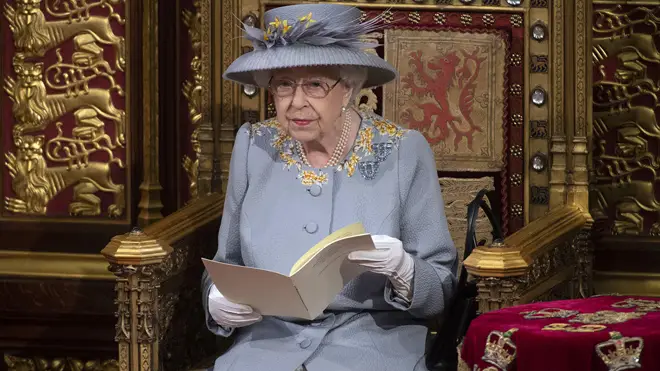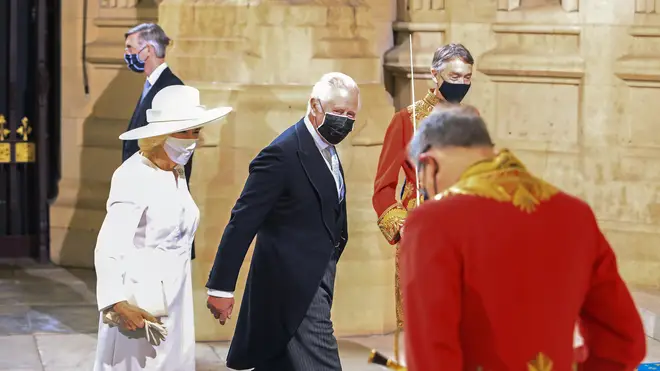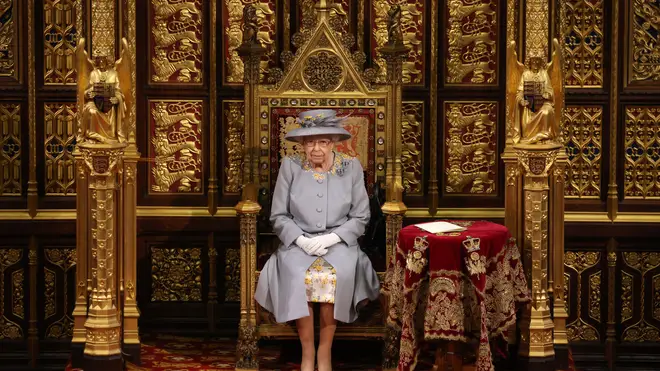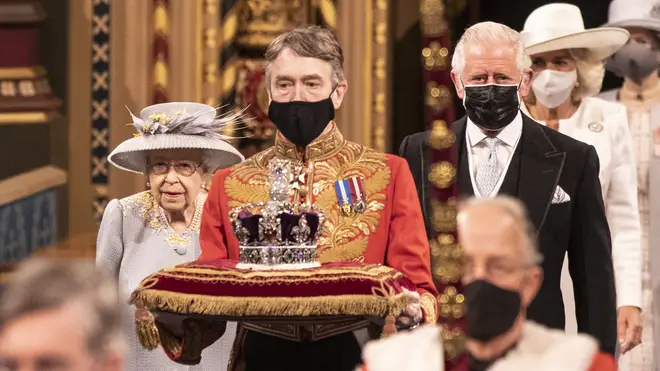
Paul Brand 7am - 10am
11 May 2021, 12:45 | Updated: 11 May 2021, 13:58

The Queen has set out the laws Boris Johnson's government will attempt to pass in Parliament this year in her first major public appearance since the death of the Duke of Edinburgh.
It marked the first official public engagement outside of Windsor Castle since the death of Prince Philip, who died on 9 April at the age of 99.
For the first time in her reign, a single ornate golden throne was placed under the gold canopy in the House of Lords.
Previously there was a pair of thrones - for the Queen and her consort.
Her Majesty was accompanied by her son the Prince of Wales and his wife the Duchess of Cornwall, who each wore facemasks.
The ceremony was unusually parred down compared with traditional years, as the ongoing Covid-19 pandemic forced the usually packed Houses of Parliament to be left sparse to ensure social distancing measures are followed.

Unsurprisingly, one of the key points of the speech was in regards to healthcare and the ongoing pandemic.
Her speech began with saying that her Government's "priority is to deliver a national recovery from the pandemic".
The UK has been steaming ahead with its vaccination programme, and Her Majesty said "additional funding" will be given to support the NHS.
Her Majesty also said legislation would be brought forward to empower the NHS to innovate and embrace technology.
In terms of patient care, patients will receive more tailored and preventative care, closer to home under the Health and Care Bill and measures will be brought forward to tackle obesity and improve mental health.

One of the most controversial policies is the Electoral Integrity Bill, which would require people to show a form of ID at a polling booth to be able to vote.
This is despite a tiny number of in-person allegations of voter fraud being made each year.
The Dissolution and Calling of Parliament Bill would also dissolve the Fixed-Term Parliaments Act brought in by David Cameron and Nick Clegg's coalition, and would allow the power to decide when an election is called to lie with a PM.
Speakers at Universities who are cancelled or no-platformed would be able to claim compensation under the Higher Education (Freedom of Speech) Bill.
Universities and Student Unions would also have to “take steps to secure lawful freedom of speech” as part of law if the Bill is passed.

The Queen unveils the Government's plans for housing
The Building Safety Bill would bring in raft of measures to increase the safety of tower blocks post-Grenfell.
It would bring in a list of “accountable persons” who would show who is responsible for keeping a tower block safe.
A White Paper would also bring in a financing system for cladding to be replaced. However, those who live in a block shorter than 18 metres would have to pay £50 a month to get a load for dangerous cladding to be replaced.
The Leasehold Reform (Ground Rent) Bill will also end the practice of expensive Ground Rents for new leasehold buildings.
One of the more controversial parts of the Queen's Speech is the Police, Crime, Sentencing and Courts Bill, which will introduce a raft of new restrictions on protests in the UK.
It would also bring in more popular measures such as longer sentences for sex offenders, drink drivers and people who assault emergency workers.

Boris Johnson's Government has vowed to push ahead with the “most significant overhaul of our asylum system in decades”.
Under the New Plan for Immigration Legislation, asylum seekers who have travelled via a “safe country” will be banned from making an asylum application.
Their “legal or illegal” status in the UK will be explicitly factored into their application to become a refugee, in a move which has enraged human rights activists as people are fleeing persecution.